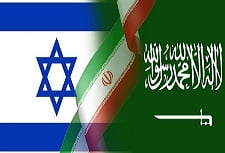
Article originally published in March 2014
Over the past months, the level of intense cooperation between Israel and Saudi Arabia in targeting Iran has become clear. I’ve posted here about secret meetings between top Israeli and Saudi intelligence figures which have allowed coordination of the campaigns involving both Syria and Iran. But Shalom Yerushalmi, writing in Maariv, dropped an even more amazing bombshell. Saudi Arabia isn’t just coordinating its own intelligence efforts with Israel. It’s actually financing a good deal of Israel’s very expensive campaign against Iran. As you know, this has involved massive sabotage against IRG missile bases, the assassination of five nuclear scientists, the creation of a series of computer cyberweapons like Stuxnet and Flame. It may also conceivably involve an entire class of electronic and conventional weapons that could be used in a full-scale attack on Iran. Who knows, this might even include the sorts of bunker buster bombs only the U.S. currently has access to, which could penetrate the Fordo facility. It might include scores more super-tankers which could provide the fuel necessary for Israeli planes to make it to Iran and return. All of this is expensive. Very expensive. We can see just how expensive by examining Barry Lando’s October 2012 investigative piece also based on Israeli sources which says the Saudi funding may exceed $1-billion:
A friend, with good sources in the Israeli government, claims that the head of Israel’s Mossad has made several trips to deal with his counterparts in Saudi Arabia—one of the results: an agreement that the Saudis would bankroll the series of assassinations of several of Iran’s top nuclear experts that have occurred over the past couple of years. The amount involved, my friend claims, was $1 billion dollars. A sum, he says, the Saudis considered cheap for the damage done to Iran’s nuclear program.
Returning to Yerushalmi, he referred to Bibi’s recent Aipac speech and an implicit reference in it to Saudi Arabia:
Netanyahu spoke there, for the first time in his life, about the benefits of peace, the prosperity that will follow, about the possibility that Arab states, which today maintain better relations with us than those in the European Union, but in private, will do so publicly if we only reach an agreement with the Palestinians. Netanyahu referred almost certainly to Saudi Arabia, which finances the expenses of the enormous campaign which we are conducting against Iran.
In the past, I’ve noted that George Bush allocated $400-million in 2007 for just such sabotage directed against Iran. I presumed that a good deal of that funding might end up supporting similar sorts of Israeli efforts. It’s possible that the new Obama administration cut off this funding after assuming office in 2008. Whatever the reason, Saudi Arabia is now a critical funder of Israel’s military effort against Iran.
The question is how far is Saudi Arabia willing to go. If Bibi ever decided to launch an attack, would the Sunni nation fund that as well? The answer seems clearly to be yes.
The next question is, given there is airtight military censorship in Israel, why did the censor allow Maariv to publish this? Either someone was asleep at the switch or the IDF and Israel’s political and intelligence officials want the world to know of the Saudi-Israeli effort. Who specifically do they want to know? Obama, of course. In the event the nuclear talks go south, Bibi wants Obama to know there’s a new Sugar Daddy in town. No longer will Israel have only the U.S. to rely on if it decides to go to war. Saudi Arabia will be standing right behind.
This isn’t the first time that foreign sources played a major role in subsidizing critical Israeli efforts to develop such game-changing weapons systems. In the early 1960s, Abraham Feinberg, a wealthy American Jew whose name now graces a building a Brandeis University, coordinated a major fundraising effort on behalf of Israeli Prime Minister Ben Gurion. As a result, American Jews played an instrumental role in paying for Israel’s first nuclear weapons.
Frankly, I don’t think this news substantially alters the military calculus. Israel, even with unlimited funding, still can’t muster the weapons and armaments it would need to do the job properly. That will take time. But Israel isn’t going to war tomorrow. This news reported in Maariv is presumably Bibi playing one card from his hand. It’s an attempt to warn the president that the U.S. is no longer the only game in town. Personally, it’s the sort of huffing and puffing that I can’t imagine plays well in Washington. But it’s the way Bibi plays the game.
